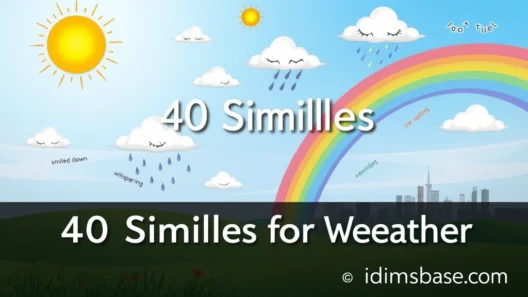Are you ready to dive into the fascinating world of self-description? We often find ourselves searching for the perfect words to explain who we are, what we feel, or how we act. Sometimes, plain words just don't quite capture the essence. That's where similes come in!
Similes are like magic wands for your language. They help you compare yourself to something else using "like" or "as," painting a vivid picture in the minds of others. It’s a super fun and creative way to express yourself, whether you're writing, talking, or just thinking about your own unique qualities. Get ready to explore 40 fantastic similes that can help you describe yourself in a fresh, engaging way!
Why Use Similes to Describe Yourself?
You might be wondering, "Why bother with similes when I can just say I'm happy or busy?" Well, similes do so much more than just state a fact. They add depth, emotion, and a touch of personality to your descriptions.
Think about it: Saying "I'm busy" is fine. But saying "I'm as busy as a bee" instantly creates an image of constant activity, buzzing around from task to task. It's more memorable, more impactful, and certainly more imaginative! Using similes shows your creativity and helps others understand you on a deeper level.
40 Brilliant Similes to Describe Yourself
Let's get to the good stuff! Here are 40 similes, broken down into categories, to help you find the perfect way to describe you.
Similes for Your Personality and Mood
These similes help express your inner self, your typical demeanor, or how you're feeling right now.
- As happy as a clam: When you're feeling absolutely joyful and content.
- As cool as a cucumber: For those moments when you're calm and collected, even under pressure.
- As quiet as a mouse: If you're shy, reserved, or just in a very thoughtful mood.
- As busy as a bee: Constantly working, moving, and getting things done.
- As bright as a button: Cheerful, lively, and quick-witted.
- As free as a bird: Feeling unburdened, unrestricted, and soaring with possibility.
- As stubborn as a mule: When you're determined and won't change your mind easily.
- As gentle as a lamb: Kind, soft-spoken, and compassionate.
- As sharp as a tack: Intelligent, quick to understand, and perceptive.
- As fresh as a daisy: Feeling energetic, vibrant, and renewed.
- Like a fish out of water: Feeling uncomfortable or out of place in a situation.
- Like a deer in headlights: Feeling frozen and unable to react due to surprise or fear.
- Like a kid in a candy store: Overwhelmed with excitement and delight, especially when presented with many options.
- Like a broken record: Repeating yourself over and over again, perhaps without realizing it.
- Like a moth to a flame: Irresistibly drawn to something, even if it might be dangerous.
Similes for Your Actions and Habits
These similes describe how you behave or your typical routines.
- As quick as a flash: Moving or reacting extremely fast.
- As slow as molasses: Taking a very long time to do something.
- As regular as clockwork: Very consistent and predictable in your habits.
- As strong as an ox: Possessing great physical strength.
- As blind as a bat: Unable to see well, especially in the dark.
- As deaf as a post: Unable to hear well.
- Like a bull in a china shop: Clumsy, awkward, and prone to breaking things.
- Like a chameleon: Able to adapt easily to different situations or blend in with various groups.
- Like a sponge: Eager to absorb new information, knowledge, or experiences.
- Like a detective: Observant, curious, and always looking for clues or answers.

Similes for Your Appearance or State
Sometimes, you might want to describe how you look or your physical condition.
- As white as a ghost: Looking very pale, perhaps from fear or illness.
- As thin as a rail: Very slender.
- As fit as a fiddle: In excellent physical health.
- As clean as a whistle: Extremely neat and tidy.
- As clear as crystal: Very easy to understand, or very transparent.
Similes for Your Impact or Role
These similes describe the effect you have on others or your typical role in a group.
- Like a rock: Dependable, stable, and a source of support for others.
- Like a lighthouse: Guiding others, offering hope, or providing clarity in difficult times.
- Like a spark plug: Energizing a group, initiating action, or getting things started.
- Like an open book: Easy to read, transparent, and not hiding anything.
- Like a well-oiled machine: Working efficiently and smoothly, especially in a team setting.
- Like a broken compass: Feeling lost, directionless, or unsure of your path.
- Like a phoenix: Rising from difficulties stronger and renewed.
- Like a diamond in the rough: Having great potential, even if it's not immediately apparent.
- Like glue: Sticking with something or someone, showing loyalty or persistence.
- Like a breath of fresh air: Bringing a new, positive, and welcome energy to a situation.
How to Choose the Right Simile for You
With so many options, how do you pick the perfect one? It's all about context and how you're truly feeling or what you want to emphasize.
Consider Your Audience
Who are you talking to? A close friend? A potential employer? This can influence how playful or serious you want to be.

Think About the Emotion
What emotion are you trying to convey? Joy? Frustration? Calmness? Pick a simile that aligns with that feeling.
Be Authentic
The best simile is one that truly feels like you. Don't force it! If it doesn't resonate, try another one.
Don't Be Afraid to Experiment!
Play around with different similes. You might surprise yourself with how well some of them fit. Language is a playground, so have fun with it!
Key Takeaways
- Similes are powerful tools: They add color, depth, and personality to your descriptions.
- They make you memorable: A good simile sticks in people's minds.
- They show creativity: Using similes demonstrates your imaginative side.
- Context is key: Choose similes that fit the situation and your true feelings.
- Practice makes perfect: The more you use them, the more natural they'll become.
Frequently Asked Questions (FAQs)
Q1: What is the difference between a simile and a metaphor?

A simile explicitly compares two unlike things using "like" or "as" (e.g., "He is as strong as an ox"). A metaphor directly states that one thing is another, without "like" or "as" (e.g., "He is an ox," implying he is very strong). Similes make a comparison, while metaphors make an identification.
Q2: Can I invent my own similes?
Absolutely! In fact, creating your own similes is a fantastic way to express your unique perspective. The key is to make sure the comparison is clear and makes sense to your audience. Don't be afraid to get creative and think outside the box!
Q3: Are similes only used in writing?
Not at all! Similes are very common in everyday conversation. We use them all the time without even realizing it. They help us communicate more vividly and efficiently in spoken language too.
Q4: How can using similes improve my communication skills?
Using similes makes your language more engaging and descriptive. It helps your audience visualize what you're trying to convey, making your message clearer and more impactful. It also shows that you're an articulate and thoughtful communicator.
Q5: Can similes be negative?
Yes, similes can certainly be used to describe negative qualities or feelings. For example, "as cold as ice" can describe an unfriendly person, or "like a lead balloon" can describe something that failed miserably. They are versatile tools for expressing a full range of emotions and characteristics.
Q6: How often should I use similes?
While similes are wonderful, using too many in one conversation or piece of writing can make your language sound forced or overly flowery. The best approach is to use them strategically, when they can add significant value or impact to your description. Aim for quality over quantity!
Q7: Where can I find more similes?
You can find similes everywhere! Reading books, listening to songs, watching movies, and even just paying attention to everyday conversations will expose you to many different similes. There are also many online resources and dictionaries dedicated to figures of speech.
Ready to Describe Yourself?
Now that you have a whole treasury of similes at your fingertips, which one will you pick to describe yourself today? Try one out in your next conversation, or even just in your own thoughts. You might be surprised how much fun it is to paint a picture of yourself with words. Go on, give it a try – you're as ready as you'll ever be!






